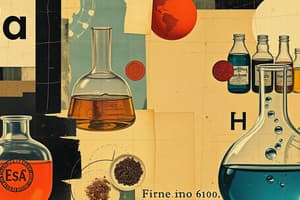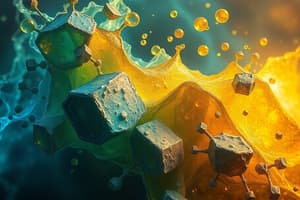Podcast
Questions and Answers
What are two common uses of non-metals?
What are two common uses of non-metals?
Insulation and fuels
Name a non-metal commonly used in the production of medical gases.
Name a non-metal commonly used in the production of medical gases.
Oxygen
Why are non-metals such as polystyrene and polyurethane used as insulation materials?
Why are non-metals such as polystyrene and polyurethane used as insulation materials?
Due to their poor conductivity
What are two common uses of metals?
What are two common uses of metals?
What are the distinct properties of metals?
What are the distinct properties of metals?
Name one common use of metals in construction.
Name one common use of metals in construction.
In which industry are metals extensively used for components like engines and chassis?
In which industry are metals extensively used for components like engines and chassis?
Why are metals often used in the production of electronic components?
Why are metals often used in the production of electronic components?
Which metal is commonly used in the construction of aircraft?
Which metal is commonly used in the construction of aircraft?
What are the properties of non-metals at room temperature?
What are the properties of non-metals at room temperature?
Flashcards are hidden until you start studying
Study Notes
Metals and Non-metals
Metals and non-metals are two broad categories of elements that have distinct properties and uses. Metals are elements that are typically solid at room temperature, have good conductivity, and are shiny and malleable. Non-metals, on the other hand, are typically not solid at room temperature, are poor conductors, and are often found in a gaseous state at room temperature.
Uses of Metals
Metals have a wide range of uses due to their unique properties, including their strength, conductivity, and malleability. Some of the most common uses of metals include:
- Construction: Metals are often used in construction due to their strength and durability. For example, steel is commonly used in the construction of buildings and bridges, while aluminum is often used in the construction of aircraft.
- Transportation: Metals are used extensively in the automotive industry, where they are used in the construction of engines, chassis, and other components.
- Electronics: Metals are often used in the production of electronic components such as wires and circuit boards, due to their conductivity.
- Medical: Metals such as stainless steel are used in the production of medical equipment and implants due to their strength and biocompatibility.
Uses of Non-metals
Non-metals, while not as commonly used as metals, still have a wide range of applications. Some of the most common uses of non-metals include:
- Insulation: Non-metals such as polystyrene and polyurethane are commonly used as insulation materials due to their poor conductivity.
- Fuels: Non-metals such as methane and propane are commonly used as fuels due to their energy density.
- Chemicals: Non-metals such as hydrogen and oxygen are commonly used in the production of chemicals due to their reactivity.
- Medical: Non-metals such as nitrogen and oxygen are commonly used in the production of medical gases for use in hospitals and other healthcare settings.
In conclusion, metals and non-metals have a wide range of uses due to their distinct properties. Metals are used extensively in construction, transportation, electronics, and medical applications, while non-metals are used in insulation, fuels, chemicals, and medical applications.
Studying That Suits You
Use AI to generate personalized quizzes and flashcards to suit your learning preferences.




